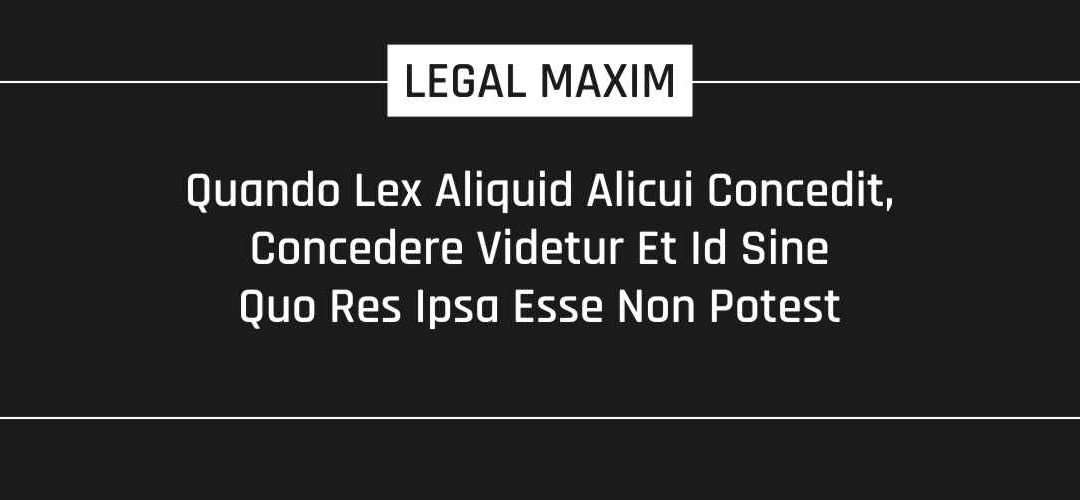Literal Meaning
When the law gives anything to anyone, it also gives all those things without which the thing itself could not exist.
Origin
Latin
Explanation
According to this maxim, whoever grants a thing is supposed also tacitly to grant that without which the grant itself would be of no effect. Thus, whenever anything is authorized, especially as a matter of duty required to be done by law, it is found impossible to do that thing unless something else not authorized in express terms is also done. Such something else will be supplied as a necessary intendment.
Illustration
A sells to B, a piece of land that has sole access to the main road, which is on a pathway through A’s land. B, upon taking possession is told by A that he does not have access through A’s land which was bought separately. In such case B would plead Quando lex aliquid alicui concedit, concedere videtur et id sine quo res ipsa esse non potest, since his possessed property is useless without access through A’s property.
Case Laws
In Gian Singh vs the State of Punjab & Anr., the Supreme Court held that “Courts, have inherent powers apart from express provisions of law which are necessary for the proper discharge of functions and duties imposed upon them by law. That is the doctrine which finds expression in the section which merely recognizes and preserves inherent powers of the High Courts. All courts, whether civil or criminal possess, in the absence of any express provision, as inherent in their constitution, all such powers as are necessary to do the right and to undo a wrong in course of administration of justice on the principle Quando lex aliquid alicui concedit, concedere videtur et id sine quo res ipsae esse non potest (when the law gives a person anything it gives him that without which it cannot exist). While exercising powers under the section, the court does not function as a court of appeal or revision. Inherent jurisdiction under the section though wide has to be exercised sparingly, carefully and with caution and only when such exercise is justified by the tests specifically laid down in the section itself.”
In Manish Madan & Anr. vs State, the Delhi High Court held that the Section 482 of Criminal Procedure Code is based upon the maxim Quando lex aliquid alicui concedit, concedere videtur id sine qua res ipsa esse non potest i.e. when the law gives anything to anyone, it also gives all those things without which the thing itself would be unavoidable. The section confers a very wide power on the Court to do justice and to ensure that the process of the court is not permitted to be abused.
In Dinesh Dutt Joshi vs State Of Rajasthan And Anr., the Supreme Court held that “Section 482 of the Code of Criminal Procedure confers upon the High Court inherent powers to make such orders as may be necessary to give effect to any order under the Code, or to prevent abuse of the process of the any Court or otherwise to secure the ends of justice. The principle embodied in Section is based upon the maxim: Quando lex aliquid alicuiconcedit, concedere videtur id quo res ipsa esse non potest i.e. when the law gives anything to anyone, it gives also all those things, without which the thing itself would be unavailable. The section does not confer any new power but only declares that the High Court possesses inherent powers for the purposes specified in the Section. As Lacunae are sometimes found in procedural law, the Section has been embodied to cover such Lacunae wherever they are discovered. The use of extraordinary powers conferred upon the High Court under this Section is however required to be reserved, as far as possible, for extraordinary cases.”
